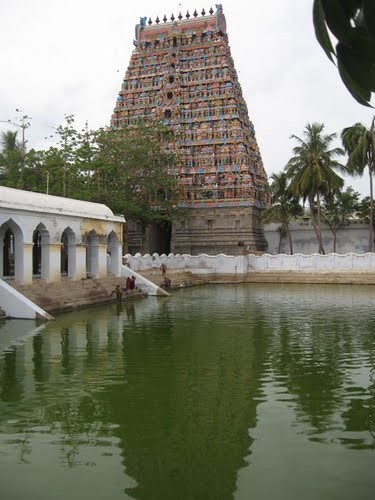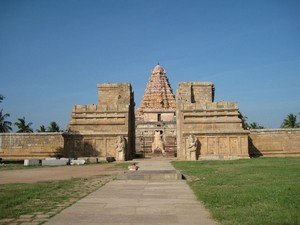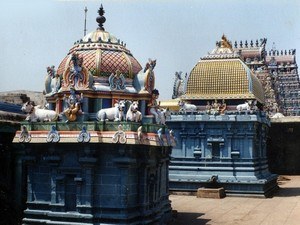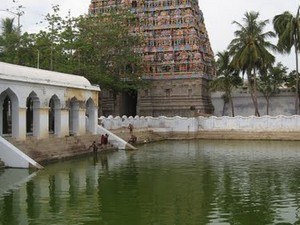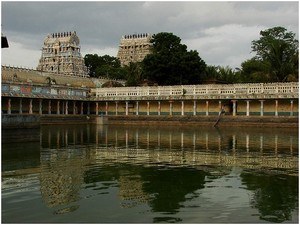Mayiladuthurai, Chidambaram - Timings, Festivals, History, Darshan, Pooja Timings
Photo Credit: Flickr
 #5 of 19 Places to Visit in Chidambaram
#5 of 19 Places to Visit in Chidambaram
 Distance (From Chidambaram): 42 Kms
Distance (From Chidambaram): 42 Kms
 Trip Duration (Including Travel): 3-4 Hours
Trip Duration (Including Travel): 3-4 Hours
 Transportation Options: Bus / Cab
Transportation Options: Bus / Cab
 Travel Tips: None
Travel Tips: None
About Mayiladuthurai
At a distance of 37 Km from Kumbakonam, 37 Km from Karaikal and 42 Km from Chidambaram, Mayiladuthurai, formerly known as Mayavaram or Mayuram, is a special grade municipality, and the district headquarters of Mayiladuthurai district in Tamil Nadu, India. Mayiladuthurai is known for the Mayuranatha Swamy Temple, among the must visit pilgrimage sites in Tamil Nadu. The temple is dedicated to Lord Mayuranathar, a manifestation of Shiva, and has given its name to the town. This temple is one of six temples that are regarded as equivalent to the Kashi Vishwanatha Temple in Varanasi. The other five Shivasthalams include Tiruvenkaadu, Chaayaavanam, Tiruvaiyaru, Tiruvanchiam, and Tiruvidaimarudur.
History of Mayiladuthurai
Often recognized as the entry point to the Chola temples, Mayiladuthurai serves as a significant historical and spiritual center, drawing both devotees and travelers who are keen to explore Tamil Nadu's rich traditions and architectural heritage. The region was once governed by the Medieval Cholas and later came under the control of several dynasties, including the Vijayanagar Empire, the Thanjavur Nayaks, the Thanjavur Marathas, and the British Empire. The region, however, is known to have been inhabited since the 3rd millennium BC. Until India's independence in 1947, Mayiladuthurai was part of the former Tanjore district, and it remained within Thanjavur district until 1991, after which it became part of the newly established Nagapattinam district. In 2020, Mayiladuthurai was officially designated as the 38th district of Tamil Nadu, having been separated from Nagapattinam district.
Mythology of Mayiladuthurai
As per the legend, Lord Shiva once became enraged with Goddess Parvathi, resulting in him cursing her to be reborn as a peahen. Subsequently, she expressed remorse for her actions and sought forgiveness. To lift the curse, she prayed at this location. Moved by her devotion, Lord Shiva is believed to have granted her pardon. In this context, the principal deity, Lord Shiva, is known as Mayuranathar, as Goddess Parvathi worshipped him in the form of a peahen, or mayura. Consequently, the place is named 'Mayurapuram' and 'Mayavaram,' which later evolved into Mayiladuthurai.
Things to do in Mayiladuthurai
The renowned Mayuranathar Temple, also known as Mayuranatha Swamy Temple, stands as the principal attraction in Mayiladuthurai. This sacred site is dedicated to Lord Shiva, revered here as Mayuranathar, which translates to 'husband of Mayuram.' Constructed by the Medieval Cholas, the temple underwent significant reconstruction using stone in the 10th century under the patronage of Sembiyan Mahadevi. The earliest inscriptions found on the temple walls trace back to the era of Kulothunga Chola I. Unfortunately, renovations carried out in the 19th century have led to the loss of many ancient structures and inscriptions.
Exemplifying Dravidian architectural style, the temple comprises five prakarams, a nine-tiered gopuram, and fourteen vimanams adorned with numerous stucco images. The sanctum sanctorum enshrines Lord Shiva in the form of a Lingam known as Mayuranathar, while his consort, Abhayambika, is depicted as a peahen in a separate shrine. The temple complex also includes smaller shrines dedicated to Vinayakar, Natarajar, and Durga. At the heart of the complex lies a large temple tank, which attracts numerous visitors who come to bathe in its waters on the new moon day of the Tamil month Aippasi (November-December). This ritual is believed to cleanse individuals of sins, as the waters of the Ganges and other Indian rivers are said to merge with those of the Kaveri River in the tank on this auspicious day.
Festivals of Mayiladuthurai
Mayiladuthurai is renowned for vibrant religious festivals that are celebrated throughout the year. Among the most significant celebrations are Pongal in January, the annual chariot festival at the Mayuranathaswami Temples occurring in January or February, and Thula Utsavam in October or November. These events draw a substantial number of devotees to the region.
Dress Code & Other Restrictions of Mayiladuthurai Temple
When planning a visit to the Mayuranathar Temple, it is advisable to follow appropriate dress codes. Men should consider wearing a dhoti or pajama along with a shirt, or alternatively, formal trousers and a shirt. Women are encouraged to choose attire such as a saree, half saree, or churidhars. It is important to avoid modern clothing items like mini-skirts, low-waist jeans, shorts, and sleeveless tops while on the temple premises.
Non-Hindus are permitted to explore the temple grounds and admire its architectural splendor; however, entry to the sanctum sanctorum may be limited.
Mayiladuthurai Temple Timings
Monday: 5:30 AM - 12 PM and 4 PM - 8:30 PM
Tuesday: 5:30 AM - 12 PM and 4 PM - 8:30 PM
Wednesday: 5:30 AM - 12 PM and 4 PM - 8:30 PM
Thursday: 5:30 AM - 12 PM and 4 PM - 8:30 PM
Friday: 5:30 AM - 12 PM and 4 PM - 8:30 PM
Saturday: 5:30 AM - 12 PM and 4 PM - 8:30 PM
Sunday: 5:30 AM - 12 PM and 4 PM - 8:30 PM
Mayiladuthurai Temple Entry Fee
Entry is Free
Best Time to Visit Mayiladuthurai
Being a coastal town, Mayiladuthurai is ideally explored during the winter months from November to February, when the climate is cool and suitable for sightseeing and temple visits. This season features a variety of festivals, including Pongal, the annual chariot festival at the Mayuranathaswami Temple, and Thula Utsavam in October and November, all of which highlight the rich cultural heritage and traditions of Tamil Nadu. In contrast, the summer months are characterized by intense heat, with temperatures frequently exceeding 40 degrees Celsius. Additionally, the period from June to September experiences heavy rainfall, rendering it an unsuitable time for travel to Mayiladuthurai.
How to Reach Mayiladuthurai
The Pondicherry Airport is the nearest airport to Mayiladuthurai which is about 114 Km way. Mayiladuthurai Junction is well-connected by trains with Chennai, Thanjavur, Trichy, Kochi, Bangalore, Mumbai, and Hyderabad. Visitors can hire taxis or take buses to reach Mayiladuthurai from nearby towns, and cities like Kumbakonam, Thanjavur, Trichy, Coimbatore, Chidambaram, Pondicherry, and Chennai.



